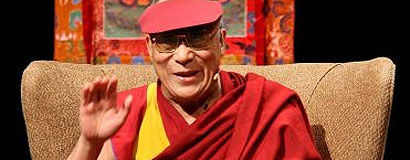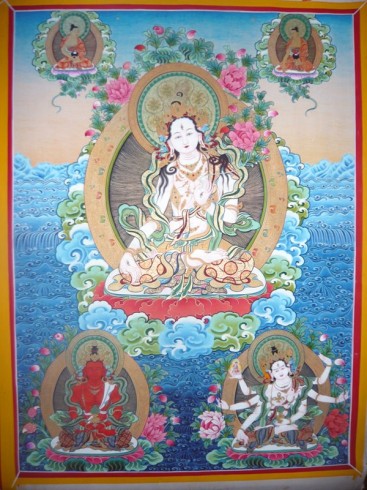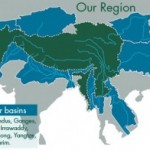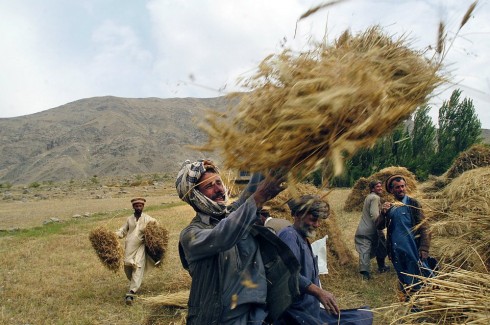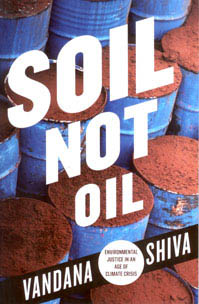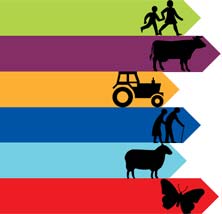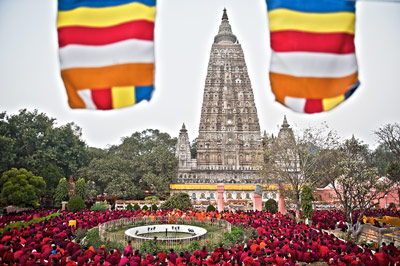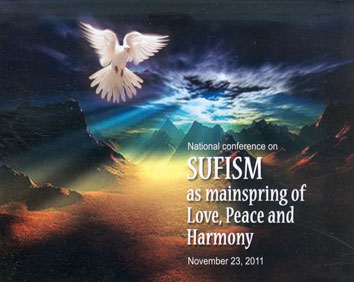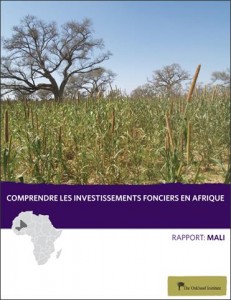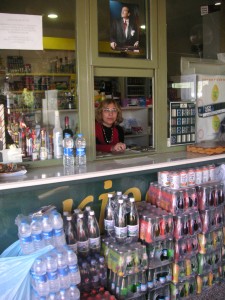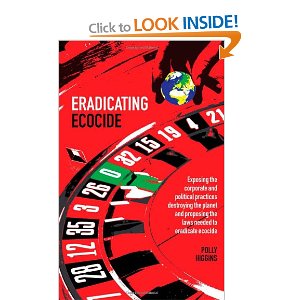Trad. & Indigenous Medicine
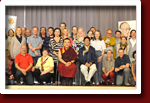
Dalai Lama stattet Österreich im Mai bisher längsten Besuch ab
Dalai Lama stattet Österreich im Mai bisher längsten Besuch ab. Der Dalai Lama wird im Mai zehn Tage in Österreich weilen und dem Land damit seinen bisher längsten Besuch abstatten. Das Oberhaupt der Tibeter reist nach Kärnten, Salzburg und Wien. Am Donnerstag wurde das Besuchsprogramm präsentiert.
Zum vierten Mal seit 1992 besucht das Oberhaupt der Tibeter Österreich, von 17. bis 26. Mai wird der Dalai Lama bleiben. Der Direktor des Tibetzentrums in Hüttenberg (Kärnten), Lama Geshe Tenzin Dhargye, präsentierte am Donnerstag in Wien gemeinsam mit dem Kärntner Landeshauptmann Gerhard Dörfler (FPK) das Besuchsprogramm.
Kärnten: „Die Kunst des Glücklichseins“
Den Auftakt des Dalai Lama-Besuchs stellt ein Treffen mit den Schülern des Tibetzentrums in Hüttenberg, dar. An den darauffolgenden zwei Tagen stehen dann in der Klagenfurter Messehalle „buddhistische Unterweisungen“ auf dem Programm. Am 20. Mai wird am selben Ort ein Vortrag unter dem Titel „Die Kunst des Glücklichseins“ stattfinden. Ein Thema, das dem Dalai Lama laut Geshe Dhargye besonders am Herzen liegt: „Seine Heiligkeit glaubt, dass es notwendig ist, eine Spiritualität zu schaffen, die von allen Menschen – egal ob gläubig oder nicht – angenommen werden kann. Aus dieser können dann jene menschlichen Werte entstehen, die eine Schlüsselrolle auf dem Weg zum Glücklichsein einnehmen.“
Salzburg: Internationale Flüchtlingsproblematik im Mittelpunkt
Anschließend geht die Reise weiter nach Salzburg, wo beim Besuch in der Salzburgarena das Thema „Weltfrieden und universelle Verantwortung“ im Mittelpunkt steht. Vor allem die internationale Flüchtlingsproblematik soll dabei behandelt werden, sagte Ernst Löscher, Direktor der Flüchtlingshilfeorganisation „Alpine Peace Crossing“ (APC), der die Vorträge in Salzburg mit organisierte. Denn: „Der Dalai Lama ist wahrscheinlich der prominenteste Flüchtling, den es gibt.“ Am Nachmittag wird der Dalai Lama mit dem Salzburger Erzbischof Alois Kothgasser, der evangelischen Superintendentin Luise Müller, dem Präsidenten der islamischen Glaubensgemeinschaft Fuat Sanac und dem Wiener Gemeinderabbiner Schlomo Hofmeister zusammentreffen und mit ihnen über die Möglichkeit religiöser Harmonie in Zeiten der Globalisierung diskutieren.
Wien: Berührungspunkte zwischen Wissenschaft und Buddhismus
In der Wiener Stadthalle hält das tibetische Oberhaupt dann am 25. Mai einen Vortrag unter dem Titel „Jenseits von Religion – Ethik und menschliche Werte in der heutigen Gesellschaft“. Den Abschluss wird am 26. Mai das wissenschaftlich-religiöse Symposium „Geist und Materie – neue Modelle der Realität“ an der Universität Wien bilden. Gemeinsam mit den Quantenphysiker Anton Zeilinger, einem langjährigen Freund des buddhistischen Oberhauptes, und weiteren führenden Wissenschaftlern aus Physik, Neurowissenschaft und Philosophie wird der Dalai Lama über Berührungspunkte zwischen Wissenschaft und Buddhismus diskutieren.
Previous articles #dalai lama #tibet #humanrights
http://religion.orf.at/projekt03/news/1204/ne120426_dalailama.html
(APA)
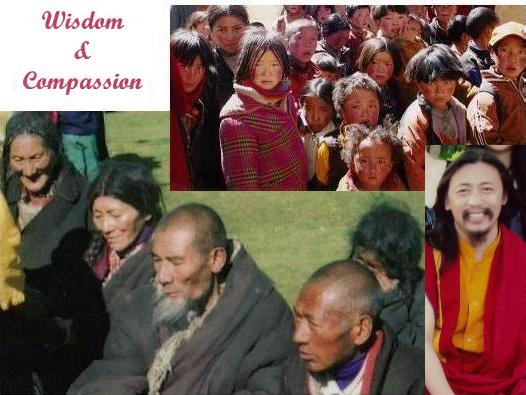
Freedom of Religion & Belief – China: Tibetan Monasteries Placed Under Direct Rule
Tibetan Yoga Center – Yoga Retreats
Contact: tibetanyogainfo@gmail.com
www.bhutanzopa.com.bt/AdventureTravel
The practice of Yoga is intimately connected to the religious beliefs and practices of both Buddhism and Hinduism. However there are distinct variations in the usage of yoga terminology in the two religions. In Hinduism, the term „Yoga“ commonly refers to the eight limbs of yoga as defined in the Yoga Sutras of Patanjali, written some time after 100 BCE, and means „yoke“, with the idea that one’s individual atman, or soul, would yoke or bind with the monistic entity which underlies everything (brahman). In the Vajrayana Buddhism of Tibet, however, the term „Yoga“ is simply used to refer to any type of spiritual practice; from the various types of tantra (like Kriyayoga or Charyayoga) to ‚Deity yoga‘ and ‚guru yoga‘. In the early translation phase of the Sutrayana and Tantrayana from India, China and other regions to Tibet, along with the practice lineages of sadhana, codified in the Nyingmapa canon, the most subtle ‚conveyance‘ (Sanskrit: yana) is Adi Yoga (Sanskrit). A contemporary scholar with a focus on Tibetan Buddhism, Robert Thurman writes that Patanjali was influenced by the success of the Buddhist monastic system to formulate his own matrix for the version of thought he considered orthodox. Read More: HERE
Early Buddhism incorporated meditative absorption states. The most ancient sustained expression of yogic ideas is found in the early sermons of the Buddha. One key innovative teaching of the Buddha was that meditative absorption must be combined with liberating cognition. The difference between the Buddha’s teaching and the yoga presented in early Brahminic texts is striking. Meditative states alone are not an end, for according to the Buddha, even the highest meditative state is not liberating. Instead of attaining a complete cessation of thought, some sort of mental activity must take place: a liberating cognition, based on the practice of mindful awareness. The Buddha also departed from earlier yogic thought in discarding the early Brahminic notion of liberation at death. Liberation for the Brahminic yogin was thought to be the realization at death of a nondual meditative state anticipated in life. In fact, old Brahminic metaphors for the liberation at death of the yogic adept were given a new meaning by the Buddha; their point of reference became the sage who is liberated in life. Read More: HERE
Dream Yoga or Milam (T:rmi-lam or nyilam; S:svapnadarśana)— the Yoga of the Dream State are a suite of advanced tantric sadhana of the entwined Mantrayana lineages of Dzogchen (Nyingmapa, Ngagpa, Mahasiddha, Kagyu and Bönpo). Dream Yoga are tantric processes and techniques within the trance Bardos of Dream and Sleep (Tibetan: mi-lam bardo) and are advanced practices of Yoga Nidra. Aspects of Dream Yoga sadhana are subsumed within the practice suite of the Six Yogas of Naropa. Read More: > HERE <
Tibetan yoga center was established to provide a program of study and practice in the Tibetan Buddhist (Vajrayana) tradition that would integrate the essence of these teachings and present them in a suitable way for practitioners in the West. The program combines the core practices relying on visualizations, yoga of channels, winds and drops, and insight into the nature of the mind (rigpa) for efficient progress on the path. The core teachings of Tibetan Yoga Center are ‚The yogas of the six bardos‘ of the Nyingma lineage of Tibetan Buddhism, summarized in the curriculum as seven courses (see the program section). The founder and master teacher of the center, Khenchen Lama Rinpoche, was at numerous occasions encouraged by his teachers to focus on helping Western students, particularly through these practices. To help bring these teachings closer to the background of Western practitioners, the program of the Tibetan Yoga Center also integrates elements of Western neuroscientific research on changes in behavior, mind and brain as a result of meditation. Building on the tradition of enlightened householder yogis in Tibet, the program of the center was developed for yogis of the current era – serious practitioners leading busy lives with work and family commitments who want to bring their spiritual practice to swift fruition to fully benefit sentient beings.
Tibetan Yoga Center operates on principles of a social business, offering teachings mostly by suggested donation and for minimal possible fees to cover expenses. The aim of the Tibetan yoga of mind is to develop universal loving kindness and compassion coupled with the ultimate wisdom of the nature of phenomena, the ultimate truth. At the basic level of achievement, one wishes happiness for oneself as well as other people.
At the medium level of achievement one realizes that the source of ultimate happiness is the understanding of the true nature of phenomena. One realizes that the most profound way to benefit sentient beings is to achieve enlightenment and works very hard towards this goal. On this path, one completely purifies his/her mental afflictions – anger, attachment, ignorance, jealousy and pride. The highest level of achievement in the Tibetan yoga of mind is the experiential understanding of our own Buddha nature – the deepest level of the mind. When one continuously sustains this realization in his/her mind stream, s/he becomes the embodiment of the union of primordial wisdom and compassion, and benefits sentient beings in limitless ways. This achievement is the essence of the Tibetan yoga and the deepest meaning of the term ’naljor‘.
TYPES OF YOGA IN TIBETAN BUDDHISM – There are six yanas (modes of spiritual practice) in Vajrayana: 1. Kriyayana, 2. Upayana, 3. Yogayana, 4. Mahayoga, 5. Anuyoga, and 6. Atiyoga. In Nyingma lineage, the main focus of practice is on Mahayoga, Anuyoga and Atiyoga.
Teaching and Practice Downloads: This section contains general teachings given by teachers of the Tibetan Yoga Center at various occasions as well as specific teachings that are part of the curriculum of the center. These teachings are available for free, but proper reference to the teachings if used as part of other materials should be included.
Previous some related #articles #videos:
Mountain Minorities and Indigenous Peoples
Yoga of Himalayas – Nuns & Communities
The Ninth Mandaean Camp Niagara Falls
UNESCO – The Tradition of Vedic Chanting
UN – Nagoya biopiracy agreement ‚is unexpected success‘
Saving the Bedouin Heritage and Biodiversity
A Call for Renewable Energy in Brazil – Belo Monte
Indigenous Australien Medicine – Bush Medicine
Build Hope – Sivananda Sevashram
ARGAN TREE – Argan Oil Morocco
Jain Tradition – Mahavir Jayanti India
Monasteries Environmental Himalayaprotection
Monks lead march to save Himalayas
Interfaith Center: Gala Dinner with Yusuf Islam
Gilgit (UNESCO Gilgit Manuscripts) Baltistan – National Conference Sufism
Bahá’í – Religion für eine neue Zeit
Introduction – Swami Vivekananda – Jnana Yoga
The Hindu approach to spiritual evolution leading to liberation or moksha or Self-realization is one of the four major paths or yogas:
-
the path of knowledge or Jnana yoga,
-
the path of mind control or Raja Yoga ,
-
the path of devotion of Bhakti yoga and
-
the path of action/work or Karma yoga.
#video Swami Vivekananda 1893 Speech at Parliament of Religions Part 1 of 4
Swami Vivekananda was the chief disciple of the 19th century saint Ramakrishna Paramahansa and the founder of the Ramakrishna Math and the Ramakrishna Mission. He is considered a key figure in the introduction of Indian philosophies of Vedanta and Yoga to the „Western“ world, mainly in America and Europe and is also credited with raising interfaith awareness, bringing Hinduism to the status of a major world religion during the end of the 19th century CE. Vivekananda is considered to be a major force in the revival of Hinduism in modern India.
He is perhaps best known for his inspiring speech which began: „Sisters and Brothers of America,“ through which he introduced Hinduism at the Parliament of the World’s Religions in Chicago in 1893.
The Council for a Parliament of the World’s Religions works to cultivate harmony among the world’s religious and spiritual communities to achieve a just, peaceful and sustainable world.
The first Parliament of Religions was held at the 1893 Chicago Columbian Exposition, and was the first formal meeting of the religious East and West. In 1988 the Council for a Parliament of the World’s Religions (CPWR) was founded to organize a centennial celebration of the original Parliament. Since 1993, three Parliaments have been held in Chicago, Cape Town, Barcelona and in 2009 the most recent Parliament was held in Melbourne, Australia.
Dr. Joachim Reinelt: Zur Zeit des indischen Mittelalters wanderten in weiten Teilen Indiens und Tibets tantrische Mystiker umher, die Nathas, Nathayogis oder Nathasiddhas genannt wurden. Sie praktizierten und lehrten Hatha- und Kundaliniyoga und hatten großen Einfluss auf das religiöse Leben der Menschen.
Gorakshanatha Saivism: Gorakhnath or Gorakshanatha Saivism is also known as Siddha Siddhanta and Nath tradition. It was founded by Gorakshanatha (Gorakhnath) who lived about 10th century AD. He is believed to be 3rd, 4th or 5th in a line of 12 prominent teachers of this tradition, which has followers in both Buddhism and Hinduism.
He was said to be a disciple of Matsyendranatha who was from in Nepal. Followers of this sect believe that knowledge of this tradition was received by Matsyendranath directly from Siva himself. Gorakshanatha is credited with such works as Siddha Siddhanta Paddhathi and Viveka Martanda. He composed them in Hindi. He also created 12 monastic orders across Northern India in an effort to preserve the Adinatha tradition. Other important works of this tradition are Hathayoga Pradipika, Gheranda Samhita, Siva Samhita and Jnanamrita.
History of the Nathas – The history of ancient Indian sadhu texts reveals a succession of several main groups. There were the Sadhs, Yatis, Siddhas, Nathas, Pashupatis, Sant-Mats, Dasnamis and Nagas. Apart from these, many small sadhu sects have existed and played their part in the great stream of Indian life. In early history, it would appear that some sects were interwoven with others, and some merged or developed into other sects. Some thus became extinct, and others are still with us.
Full Article: http://www.saivism.net
http://www.facebook.com/parliamentofreligions
http://en.wikipedia.org/wiki/Swami_Vivekananda
Bhutan http://en.wikipedia.org/wiki/Gross_national_happiness
UN – The Challenge of Human Rights and Cultural Diversity
UNESCO – Intangible Cultural Heritage
UN – Nagoya biopiracy agreement ‚is unexpected success‘
http://www.twnside.org.sg/title2/books/The.Road.to.an.Anti-Biopiracy.Agreement.htm
Amnesty International – What are economic, social and cultural rights?
*************************************
China: Tibetan Monasteries Placed Under Direct Rule
(New York) – The Chinese government has ended a key policy of allowing Tibetan monasteries to be run by monks who comply with government regulations and have instead introduced a system that will place almost every monastery in Tibet under the direct rule of government officials who will be permanently stationed in each religious institution, Human Rights Watch said today.
The new system now requires an unelected „Management Committee“ – also referred to as zhusi danwei/gongzuozu („monastic government work-unit“)- to be established in every monastery, with up to 30 lay officials stationed in each monastery, depending on the size of the institution, according to a February 15, 2012 article in the government-run Global Times. The new „Management Committees“ will run the monasteries and will have authority over the previous „Democratic Management Committees,“ which will now be responsible for rituals and other matters.
The freedom to leave or discontinue membership in a religion or religious group —in religious terms called „apostasy“ —is also a fundamental part of religious freedom, covered by *Article 18 of the Universal Declaration of Human Rights.[2]
Freedom of religion is a principle that supports the freedom of an individual or community, in public or private, to manifest religion or belief in teaching, practice, worship, and observance; the concept is generally recognized also to include the freedom to change religion or not to follow any religion.[1]
#video Meeting with Special Rapporteur on Freedom of Religion or Belief, Heiner Bielefeldt As always saying something on the topic of freedom of religion or belief, to say it again, the most shocking experience when dealing with case of violations of freedom of religion is the extreme manifestation and degree of hatred “ http://www.youtube.com/watch?v=81qyyKzntJw
http://www.hreoc.gov.au/human_rights/religion/index.html
http://en.wikipedia.org/wiki/Freedom_of_religion
http://www.ohchr.org/EN/Issues/FreedomReligion/Pages/FreedomReligionIndex.aspx
February 29, 2012
Australian Broadcasting Corporation – Exiled PM wants ‚fact finding‘ mission in Tibet
March 3, 2012
UN Human Rights Chief asked when she would visit Tibet
Mar 6, 2012
UN calls on China to stop forced settlement of Tibetan Nomads
8 March 2012
“Unfinished progress” – UN expert examines food systems in emerging countries reports* on China, Mexico and South Africa to the Human Rights Council. In China, local-level authorities often have allowed land-grabbing at the expense of poor rural households. And between 50 and 80 per cent of the 2.25 million nomads on the Tibetan plateau may be relocated into settlements close to rural cities, overhauling the food and farming practices of this vulnerable community as part of a programme to abandon nomadic life and modernize agriculture. ( Latest Water UN Report – World Consumption of modern agriculture on fresh water by 70% )
chinadialogue Tibetan herders are struggling to adjust to sedentary life on the edge of the city of Golmud. Xia Liwei visited one family and listened to their story. http://www.chinadialogue.net/–Who-are-these-people-now
chinadialogue As China seeks to protect a delicate corner of Qinghai, 50,000 herders have been moved off the grasslands. Ill-prepared for urban life, they face a bleak future, write Guan Guixia and Suonan Wangjie. http://www.chinadialogue.net/–Hard-times-for-eco-migrants
TIBETAN NOMADS Tibetan herder with a yak Nomadic herders are known as drokpa. They make up about 25 percent of Tibetans in Tibet. In some Tibetan counties they make up 90 percent of the population. http://factsanddetails.com/china.tibetan nomads
‘Obesogenic’ food systems & Right to food in emerging countries
OLIVIER DE SCHUTTER
U.N. SPECIAL RAPPORTEUR
ON THE RIGHT TO FOOD
Newsletter 12 March 2012
Here is the latest news from the United Nations Special Rapporteur on the Right to Food, Olivier De Schutter. You will find more information on our website.
In the spotlight
‘Obesogenic’ food systems must be reformed
“The West is exporting diabetes and heart disease to developing countries, along with the processed foods that line the shelves of global supermarkets,” warned the Special Rapporteur, calling for an urgent response to the public health disaster of poor nutrition.
On March 6th the UN expert presented an official report, entitled ‘The right to an adequate diet: the agriculture-food-health nexus’ to the UN Human Rights Council.
Instead of medicalizing diets, we must tackle the systemic problems that generate poor nutrition in all its forms, he urged, calling for the taxation of unhealthy products, regulation of foods high in saturated fats, salt and sugar and the way they are marketed, reform of wrong-headed agricultural subsidies, and support for local food systems.
Read the press release or the report and recommendations.
“Unfinished progress”
– UN expert examines food systems in emerging countries
[8 March 2012] GENEVA – “The food systems of emerging countries are at a major crossroads. Millions of people have been lifted out of poverty, yet whole communities have been left behind,” warned Olivier De Schutter, the United Nations Special Rapporteur on the right to food, after presenting his reports* on China, Mexico and South Africa to the Human Rights Council.
“As many as 19 million Mexicans and 12 million South Africans remain food insecure, and China’s rural dwellers are up to six times poorer than urban populations,” the expert said, calling on emerging countries to act now to lay the foundations for fair and sustainable food systems by implementing the following actions:
Mr. De Schutter urged emerging economies to protect the rights of land users, especially minority and vulnerable groups, and to establish in law the right to food, so it can be rapidly translated it into national strategies and institutions. He also advised supporting smallholder agriculture in the face of mega-development projects, and stopping soil and water degradation through a massive shift to agroecological practices. Likewise, the UN expert suggested the adoption of a strategy to tackle rising obesity.
| Read more… |
“Emerging countries face the huge task of feeding fast-growing populations whose increasing wealth is exerting new pressures on scant resources. They must secure and strengthen their food production bases as a matter of urgency; and they will only do so by working with farmers and their organizations, rather than against them,” he urged.
END
(*)Check the reports: China, Mexico and South Africa.
“Our food systems create sick people” – UN rights expert
“Our food systems create sick people” – UN rights expert
Do you agree? Like and share
Five ways to tackle the public health disaster of bad diets– UN expert on the right to food
GENEVA (6 March 2012) – “Our food systems create sick people,” warned today United Nations Special Rapporteur on the right to food, Olivier De Schutter. “One in seven people globally are undernourished, but many more suffer from the ‚hidden hunger‘ of micronutrient deficiency, while 1.3 billion are overweight or obese.”
“Faced with this nutritional crisis, we need to tackle the systemic problems which generate poor nutrition,” the independent expert said as he presented his report* on the agriculture-food-health nexus to the UN Human Rights Council. “However, we continue to prescribe remedies like a doctor: nutrition pills and early-life nutrition strategies for those lacking in calories; slimming pills, lifestyle advice and calorie counting for the overweight.”
In his report, Mr. De Schutter identifies five priority actions for putting nutrition at the heart of food systems in the developed and developing world:
- taxing unhealthy products;
- regulating foods high in saturated fats, salt and sugar;
- cracking down on junk food advertising;
- overhauling wrong-headed agricultural subsidies which make certain ingredients cheaper than others;
- and supporting local food production so that consumers have access to healthy, fresh and nutritious foods.
“Urbanization, supermarketization and the global spread of Western lifestyles have shaken up traditional food habits. The result is a public health disaster,” the Special Rapporteur said. “Governments have been focusing on increasing calorie availability, but they have often been indifferent to what kind of calories are on offer, at what price, to whom they are accessible, and how they are marketed.”
“We have deferred to food companies the responsibility for ensuring that a good nutritional balance emerges. Voluntary guidelines and piecemeal nutrition initiatives have failed to create a system with the right signals, and the odds remain stacked against the achievement of a healthy, balanced diet,” he said.
“The right to food means not only access to an adequate quantity of food, but also the ability to have a balanced and nutritious diet,” Mr. De Schutter noted. “Governments must not abstain from the responsibility to secure this right.”
The Special Rapporteur also identified the abundance of processed food as a major threat to improving nutrition. “Heavy processing thrives in our global food system, and is a win-win for multinational agri-food companies. Processed items can be produced and distributed on a huge scale, thanks to cheap subsidized ingredients and their increased shelf life.”
“But for the people, it is a lose-lose,” he stressed. “Heavily processed foods lead to diets richer in saturated and trans-fatty acids, salt, and sugars. Children become hooked on the junk foods targeted at them. In better-off countries, the poorest population groups are most affected, because foods high in fats, sugar and salt are often cheaper than healthy diets, as a result of wrong-headed subsidies whose health impacts have been wholly ignored.”
The UN expert noted that the West is now exporting diabetes and heart disease in developing countries, along with the processed foods which line the shelves of global supermarkets. By 2030, more than 5 million people will die each year before the age of 60 from non-communicable diseases linked to diets.
“We should not simply invest our hopes in medicalizing our diets with enriched products, or changing people’s choices through health warnings. Ambitious, targeted nutrition strategies can work, but only if the food systems underpinning them are put right,” the Special Rapporteur said.
Olivier De Schutter was appointed the Special Rapporteur on the right to food in May 2008 by the UN Human Rights Council. He is independent from any government or organization.
http://www.ohchr.org/Documents/HRBodies/HRCouncil/RegularSession/Session19/A-HRC-19-59_en.pdf
For the full briefing note entitled The World Trade Organization and the Post-Global Food Crisis Agenda: Putting Food Security First in the International Food System, visit: http://www.ohchr.org/Documents/Issues/Food/BN4_SRRTF_WTO_EN.pdf or http://www.srfood.org/images/stories/pdf/otherdocuments/20111116_briefing_note_05_en.pdf
For more information on the mandate and work of the Special Rapporteur, visit: http://www2.ohchr.org/english/issues/food/index.htm or www.srfood.org
Press contacts:
Yoonie Kim or Ulrik Halsteen (OHCHR): +41 22 917 9643 / 9323 / srfood@ohchr.org
UN Human Rights, follow us on social media:
Facebook: https://www.facebook.com/unitednationshumanrights
Twitter: http://twitter.com/UNrightswire
YouTube: http://www.youtube.com/UNOHCHR
Check the Universal Human Rights Index: http://uhri.ohchr.org/en
http://www.facebook.com/ANHInternational
http://www.facebook.com/organicconsumers
http://www.facebook.com/FoodandWaterWatch US , http://foodwatch.de/
http://bikyamasr.com/60747/un-expert-calls-for-junk-food-tax
http://www.foodsovereignty.org http://www.foodsov.org
http://en.wikipedia.org/wiki/Fat_tax
http://en.wikipedia.org/wiki/Right_to_food
http://en.wikipedia.org/wiki/Food_security
http://en.wikipedia.org/wiki/Agricultural_subsidy
Who Will be The Biggest Farm Bill Loser?
Soil Association annual conference 2012
Soil Association annual conference 2012
Facing the future: Innovation in food and farming
Royal Horticultural Halls, London
02 March 2012 http://www.soilassociation.org/conference
The Soil Association’s Conference 2012 will celebrate innovation in food and farming today. We will explore this through the two major themes of our strategy: Facing the Future, which explores the exciting scientific and technical progress being made in organic and low-input farming systems; and Good Food for All, which contributes to the important debate about food, public health and social justice.
The future of our food is in flux. According to the United Nation’s Food and Agriculture (UNFAO) special Rapporteur, Olivier de Schutter http://www.srfood.org/, ‘keeping blindly on the track of industrial agriculture is clearly unsustainable.’ If this is the case, then we need to galvanize the finest thinkers, technologists, scientists, farmers, entrepreneurs and teachers to develop new and sustainable ways of feeding a growing world population now and in the future.
In addition, the growing challenge of diet-related ill-health, in the UK and internationally, means that we need to explore the relationship between food production and its consumption. With a world that has approximately 1 billion people malnourished and 1 billion obese, there is a powerful case for bringing public health and nutritional expertise to the farming and food production table, to innovate joined-up solutions for our food future.
Navdanya
http://www.navdanya.org/campaigns
Navdanya means “nine seeds” (symbolizing protection of biological and cultural diversity) and also the “new gift” (for seed as commons, based on the right to save and share seeds In today’s context of biological and ecological destruction, seed savers are the true givers of seed. This gift or “dana” of Navadhanyas (nine seeds) is the ultimate gift – it is a gift of life, of heritage and continuity. Conserving seed is conserving biodiversity, conserving knowledge of the seed and its utilization, conserving culture, conserving sustainability.
Navdanya is a network of seed keepers and organic producers spread across 16 states in India.
Navdanya has helped set up 65 community seed banks across the country, trained over 5,00,000 farmers in seed sovereignty, food sovereignty and sustainable agriculture over the past two decades, and helped setup the largest direct marketing, fair trade organic network in the country.
Navdanya has also set up a learning center, Bija Vidyapeeth (School of the Seed) on its biodiversity conservation and organic farm in Doon Valley, Uttarakhand, North India.
2011 marked Earth University/Bija Vidyapeeth’s 10 year anniversary. Located on Navdanya’s Biodiversity and Conservation Farm, Navdanya offers celebrated courses for students to partake in from all over the world.
Our Vision
Vision Statement
“Navdanya’s vision is to accomplish such a development that all beings have a healthy environment to live, should have enough healthy food to eat and also have equal right to live, grow and evolve to their full potential through their self organisation”.
…………………………………………………………………………………………………
http://www.un.org/en/documents/udhr/index.shtml
Article 25 of United Nations Universal Declaration of Human Rights –
Everyone has the right to a standard of living adequate for the health and well-being of themselves and their family, including food, clothing, housing and medical care and necessary social services, and the right to security in the event of unemployment, sickness, disability, widowhood, old age or other lack of livelihood in circumstances beyond their control.
http://www.facebook.com/soilassociation
http://www.facebook.com/pages/Navdanya
Was wären die Schwaben ohne ihre Linsen?
>>> Traditional Food, Medicine & Biodiversity
>>> The Coming Famine: The Global Food Crisis and What We Can Do to Avoid It
Previous #articles #videos on #foodsecurity #agriculture #biodiversity
http://www.scidev.net/en/science-and-innovation-policy/science-at-rio-20

FOOD: WTO „must address“ food security
UPDATE 30.01.2012 Haircut Negotiations – Hedge Funds Bet on Profits from Greek Debt Talks SPIEGEL ONLINE – http://www.spiegel.de/international/topic/debt_crisis
The negotiations over the Greek debt haircut are becoming increasingly suspenseful, with euro-zone finance ministers and the IMF pushing investors to accept greater losses. Hedge funds, more than any others, stand to profit, and are betting that the voluntary debt rescheduling will fail. By Stefan Kaiser http://www.facebook.com/spiegelinternational
Coming Events:
7 February 2012: European Economic and Social Committee sustainability conference
Olivier De Schutter will address Workshop 1, entitled „food, water and energy for everyone“, held between 4.30 and 6.00 pm, of the Conference of the European Economic and Social Committee (EESC) Go sustainable, be responsible! European civil society on the road to Rio+20.
30 January 2012: No enough food, energy for World as population increases: U.N. report | Morocco World News http://moroccoworldnews.com
30 January 2012: With new blueprint in hand, Ban calls for action to chart more sustainable future http://www.un.org/apps/news/sustainable development
http://www.irinnews.org/Report WTO
http://www.ourworldisnotforsale.org/
“ Trade and food security is in effect a WTO issue, and so there is great frustration within the UN that this enormously restricts the role of, for example, the Food and Agriculture Organization-based Committee on Food Security „
Olivier de Schutter, UN Human Rights Council’s Special Rapporteur on the Right to Food, says: “Food security is the elephant in the room, which WTO [the World Trade Organization] must address”, pointing out that food import bills had soared by a third for poor countries this year.
WTO defending an outdated vision of food security [16 December 2011] Geneva – „Globalization creates big winners and big losers. But where food systems are concerned, losing out means sinking into poverty and hunger. A vision of food security that deepens the divide between food-surplus and food-deficit regions, between exporters and importers, and between winners and losers, simply cannot be accepted.
Food security hostage to trade in WTO negotiations: UN right to food expert [16 November 2011] Geneva – „The world is in the midst of a food crisis which requires a rapid policy response. But the World Trade Organisation (WTO) agenda has failed to adapt, and developing countries are rightly concerned that their hands will be tied by trade rules.”
Is the Doha round delivering on poverty?
Food aid on the back burner as WTO talks collapse
Some issues WTO needs to address in agriculture:
Ceilings on subsidies: Current ceilings on how much the US and the EU can spend on subsidies that distort trade are still rather high
Cotton subsidies: The US has still not fully complied with a WTO ruling in 2009 to remove subsidies for its cotton producers. African farmers could have gained from a 3.5 percent average increase in world cotton prices, if the US had cut subsidies.
Biofuel Subsidies : Not covered yet. A new study found that US ethanol subsidies may have artificially inflated maize prices by as much as 17 percent in 2011. Source: ICTSD
Some Further Sources such as http://www.un.org/en/documents/udhr/index.shtml
Read http://www.srfood.org/ Press release, „Eco-Farming Can Double Food Production in 10 Years, says UN Report“, 8 March 2011.
FARMAfrica FARM-Africa http://www.farmafrica.org.uk
Research by American Prof of International Development shows that small farms in Africa could be the solution to hunger http://www.stanforddaily.com/2012/01/13/
http://www.righttofood.org/ http://en.wikipedia.org/Right_to_food
http://cesr.org/index.php Center for Economic and Social Rights
http://www.facebook.com/World Fair Trade Organization (WFTO)
The G20 & Food Security – missing the big picture? World Trade
https://www.facebook.com/boellstiftung
http://www.business-humanrights.org/Categories/Issues/Other/Righttofood
http://www.stwr.org/imf-world-bank-trade/
http://en.wikipedia.org/wiki/Millennium_Development_Goals
http://donttradeourlivesaway.wordpress.com/
http://www.oaklandinstitute.org/issues
http://farmlandgrab.org/Olivier De Schutter: “Principles for responsible investment in agriculture”
http://www.ourworldisnotforsale.org/en/signon/stop-wto-s-doha-development-round-and-other-FTAs
The right to food, and its variations, is a human right derived from the International Covenant on Economic, Social and Cultural Rights (ICESCR). The UN Special Rapporteur on the right to food in 2002 defined it as follows: http://en.wikipedia.org/wiki/Right_to_food
http://www.amnesty.org/en/economic-social-and-cultural-rights
Join the energy [r]evolution! http://www.energyblueprint.info/ The report: ‘Energy [R]evolution: A Sustainable World Energy Outlook’, provides a detailed practical blueprint for cutting carbon emissions while achieving economic growth by replacing fossil fuels with renewable energy and energy efficiency. This phase-out of fossil fuels offers substantial benefits such as energy security, independence from world market fuel prices as well as the creation of millions of new green jobs.

Celebrate the 2012 Sundance Film Festival From Anywhere
http://www.sundance.org/festival
http://www.sundance.org/stories/blog
http://www.sundance.org/programs/native-film
“Storytellers broaden our minds: engage, provoke, inspire, and ultimately, connect us.”
—Robert Redford, President and Founder
The Sundance Film Festival is a film festival that takes place annually in Utah, in the United States. It is the largest independent cinema festival in the United States. HERE
Charity biography #433 Robert Redford has addressed environmental issues in documentaries and film for over 30 years. Read more: http://www.looktothestars.org/celebrity/443-robert-redford
Sundance Institute is a nonprofit organization dedicated to the discovery and development of independent artists and audiences. Through its programs, the Institute seeks to discover, support, and inspire independent film and theatre artists from the United States and around the world, and to introduce audiences to their new work.
Since 1981, Sundance Institute has evolved to become an internationally-recognized nonprofit organization that actively advances the work of risk-taking storytellers worldwide. Originally founded by Robert Redford in the mountains of Sundance, Utah, Sundance Institute has always provided a space for independent artists to explore their stories free from commercial and political pressures. By providing year-round creative and financial support for the development of original stories for the screen and stage, Sundance Institute remains committed to its mission to discover and develop independent artists and audiences across the globe.
#VIDEO 2012 Festival Kickoff http://www.youtube.com/sff
Sundance Film Festival Director John Cooper, and Director of Programming Trevor Groth, share some of the great things about to happen at the 2012 Sundance Film Festival.
Artist Programs
http://www.sundance.org/programs/
Through year-round support, including a series of Labs and Fellowships for screenwriters, directors, documentarians, producers, composers, and theatre artists, the Institute’s artist programs have supported more than 5,000 artists and their films.
Feature Film
The longest-running of Sundance Institute’s artist development programs, the Feature Film Program (FFP) was founded in 1981 and has since supported more than 500 independent filmmakers whose distinctive, singular films have engaged audiences worldwide. We hope to embrace the unique vision of each filmmaker we support and encourage a rigorous creative process with a focus on original storytelling. Led by Michelle Satter, each year the Program advances the work of as many as 65 emerging filmmakers from the U.S. and around the world through a year-round continuum of support from development, to production and postproduction, all the way through to festival strategy and creative marketing/distribution.
#video http://www.aiweiweineversorry.com
http://filmguide.sundance.org/ai_weiwei_never_sorry
Ai Weiwei is China’s most famous international artist, and its most outspoken domestic critic. Against a backdrop of strict censorship and an unresponsive legal system, Ai expresses himself and organizes people through art and social media. In response, Chinese authorities have shut down his blog, beat him up, bulldozed his newly built studio, and held him in secret detention.
AI WEIWEI: NEVER SORRY is the inside story of a dissident for the digital age who inspires global audiences and blurs the boundaries of art and politics. First-time director Alison Klayman gained unprecedented access to Ai while working as a journalist in China. Her detailed portrait provides a nuanced exploration of contemporary China and one of its most compelling public figures.
http://www.financialtaskforce.org/2011/12/07/an-artists-stand
Ai Weiwei is known for many things—great architecture, subversive in-your-face art, and political activism. He has also called for greater transparency on the part of the Chinese state. Director Alison Klayman chronicles the complexities of Ai’s life for three years, beginning with his rise to public prominence via blog and Twitter after he questioned the deaths of more than 5,000 students in the 2008 Sichuan earthquake. The record continues through his widely publicized arrest in Beijing in April of 2011. As Ai prepares various works of art for major international exhibitions, his activism heats up, and his run-ins with China’s authorities become more and more frequent.
In this unprecedented look at Ai and those close to him, Klayman’s camera captures his forthrightness and unequivocal stance. She gives a larger picture of the artist as an individual, a symbol of China’s oppression, and a powerful voice against a country that still denies its citizens many basic freedoms. – K.Y.
http://www.sundance.org/filmforward/destinations
http://www.sundance.org/filmforward/destination/china-2012/
Sundance Spotlights Spacey’s Wall Street Boss,
Al Pacino’s Cop
http://www.bloomberg.com/news/2012-01-17/austerity-wrong-way-to-fight-eu-crisis-stiglitz.html
Two movies about the *financial crisis — a drama starring Kevin Spacey and a documentary featuring Nobel Prize-winner Joseph Stiglitz — will be showcased at the Sundance Film Festival opening today in Utah.
On China, Stiglitz said an easing in its economic expansion to 7 percent to 8 percent is in some sense probably a “good thing.” He later told reporters at a Hong Kong briefing growth in the world’s second-largest economy is now more “sustainable.”
http://genevalunch.com/blog/2011/11/29/swiss-chinese-free-trade-good-progress-made
http://en.wikipedia.org/wiki/List_of_bilateral_free_trade_agreements
Not to be confused with Free market or Fair Trade. http://en.wikipedia.org/wiki/Free_trade
In “Margin Call,” Spacey plays an executive at a troubled Wall Street investment firm during the early days of the economic meltdown. “The Flaw,” directed by British filmmaker David Sington, explores the causes of the crisis through interviews with leading economists, Wall Street insiders and victims of the Great Recession.
Celebrate the 2012 Sundance Film Festival From Anywhere
Digital Initiatives Bring the Festival to You!
Livestream Events │ Exclusive Online Content │Social Media
We’re working to improve your experience on our site. Please click to offer your feedback.
http://www.sundance.org/video/live/ LIVE Streaming
http://www.facebook.com/sundance
http://twitter.com/sundancefest
SWAMI VIVEKANANDA’S BIRTHDAY CELEBRATION : Live Webcast
http://www.belurmath.org/news_archives/swami-vivekanandas-birthday-celebration-live-webcast/
http://www.belurmath.org/news_archives/2012/01/10/national-youth-day-12-january-2/
Previous #articles #videos # development #reliefwork
http://ramakrishna.org Ramakrishna – Vivekananda Center of New York
http://en.wikipedia.org/wiki/Vedanta
Live Webcasts from the Kalachakra Teaching
There will be live webcasts from the Kalachakra Teaching in Bodh Gaya, Bihar, India, from January 1-10, 2012. His Holiness the Dalai Lama will be teaching in Tibetan and there will be live webcasts in English, Chinese, Russian and Tibetan languages.
All times Indian Standard Time (GMT+5.30)
January 1: Short Teaching
His Holiness will give a short teaching.
Time: 1:00pm – 3:00pm
January 4-6: Preliminary Teachings
His Holiness will give preliminary teachings on Kamalashila’s „The Middling States of Meditation (gomrim barpa)“, Gyalsey Thokme Sangpo’s „37 Practices of A Bodhisattva (laklen sodunma)“, Geshe Langri Thangpa’s „Eight Verses of Training the Mind (lojong tsik gyema)“, Nagarjuna’s „The Praise to the World Transcendent (jigten ley deypar toepa)“ and Khunu Lama Tenzin Gyaltsen’s „The Precious Lamp in Praise of Bodhicitta (jangchup sem kyi toepa rinchen drolma)“.
Times: 1:00pm – 3:30pm each day
January 10: Long life empowerment and offering
A long life empowerment (tsewang) and a ceremony offering prayers for the long life of His Holiness the Dalai Lama will be performed.
Time: 9:00am – 11:00am (approximate time)
January 10: Ceremony honoring His Holiness the Dalai Lama
There will be a public felicitation ceremony for His Holiness.
Time: 1:30pm – 3:00pm
Live English language webcast can be viewed here.
Live Chinese language webcast can be viewed here.
Live Russian language webcast can be viewed here.
Live Tibetan language webcast can be viewed here.
More information and a full schedule of events at:
http://www.kalachakra2012.org/
http://www.facebook.com/DalaiLama
For times in your region 1:00pm Indian Standard Time (IST) on January 1st in India is the same as 7:30am on January 1st in London, England.
http://tibetanyouthcongress.org
http://wiki/List_of_organizations_of_Tibetans_in_exile
http://www.studentsforafreetibet.org
http://www.tchrd.org/ Human Rights Situation in Tibet
https://www.facebook.com/tibetnewsonline
http://www.facebook.com/Tibet Sites
Further Sources #articles #videos #social projects #buddhism:

NATIONAL CONFERENCE ON „SUFISM“
Conference on Sufism „as mainspring of Love, Peace and Harmony“
Opening Date: Wednesday, 23 November 2011
Closing Date: –
Additional Information : at 3.00 p.m at Lok Virsa Islamabad
The Gilgit Agency was a political unit of British India, which administered the northern half of the Princely state of Jammu and Kashmir. The Gilgit Agency was created in 1877 and was overseen by a political agent of the Governor-General of British India. The seat of the agent was Srinagar. In 1935, the Gilgit Agency leased the territory comprising the agency from the Maharaja of Jammu and Kashmir, Hari Singh, for a period of sixty years. This lease and the Gilgit Agency ceased to exist when Pakistan and India became independent countries in 1947. HERE
LOK VIRSA – AN INTRODUCTION :
Lok Virsa (The National Institute of Folk & Traditional Heritage) works towards creating an awareness of cultural legacy by collecting, documenting, disseminating and projecting folk & traditional heritage. Surveys and documentation of traditional culture is central to the objectives of the institute. The Lok Virsa delve into and surveys are conducting by mobile recording and filming units. Dedicated individuals undergo the rigorous field work, to bring back valuable results to the central archives and production facilities housed at the Lok Virsa complex at Garden Avenue Shakarparian Hills Islamabad.
Lok Virsa is an affiliate member of UNESCO, The World Craft Council, International Council of Music, The Asian Cultural Centre for UNESCO, The International Council of Museums and similar other world organizations for the dissemination of art products abroad.
http://www.rferl.org/section/Pakistan
http://www.facebook.com/Gilgit Baltistan
http://www.facebook.com/kashmirsufismsociety
http://www.facebook.com/pakistanyouthforumpage
http://hunzalandslide.blogspot.com/
http://www.facebook.com/Indian Youth Climate Network(IYCN)
http://de.wikipedia.org/Hunza Burusho people, Hunza-Mythos
http://en.wikipedia.org/Former State of Hunza (princely state)
http://www.facebook.com/International Organization of Folk Art (IOV)
https://www.facebook.com/unesco Educational, Scientific and Cultural Organization (UNESCO)
Zamana is a public interest space for learning, reflection, and action on Pakistan.
Explore: Whose Land? Whose Food?
In its first issue, Zamana delves into the thorny subject of land and food rights in Pakistan. The focus is prompted by recent news reports that amidst rising hunger and food crises, the Government of Pakistan plans to give away thousands of acres of farmland to Saudi Arabia and other foreign investors. Zamana invites more commentaries on this issue. Please send your perspective to info @ zamana.org. Further Infos: http://farmlandgrab.org/
Act: Our Land, Our Food, Pakistan is not for Sale
Sign the petition to raise your voice against land leasing to foreign clients.
UPDATE 23.11.2011 Final Declaration: Stop Land-Grabbing Now!
The Oakland Institute http://www.oaklandinstitute.org
More than a hundred civil society organizations have submitted a document entitled „Time to Act – Agriculture and Food Security and Rio+20“ as input to the UN Conference on Sustainable Development (the Rio+20 conference). The submission outlines the key actions that are needed to achieve viable food systems based on agroecological and other forms of sustainable production.
http://www.facebook.com/oak.institute
http://www.ourworldisnotforsale.org/members
http://www.facebook.com/road2rio20
A global youth mobilization towards the UN Conference on Sustainable Development (Rio+20).
http://www.timetoactrio20.org/ 20 years after the Rio Earth Summit, the planet is in a deeper environmental, energy and financial crisis.The United Nations Conference on Sustainable Development (UNCSD) in Rio de Janeiro in 2012 might be just another high-level conference stating the need to eradicate hunger and poverty, stop climate change, the loss of biodiversity, soil erosion and other serious environmental problems – and then, after the conference, life goes on as before. But it can be different. It has a historical opportunity to make important decisions and agree on actions that actually do eradicate hunger and poverty, and save the environment. It’s time to act!
Many civil society organizations have signed on to a document with proposals on issues linked to food and agriculture for the Rio2012-conference. Download the document (PDF) HERE. Download the document in Word format (doc) HERE.
If you have comments and suggestions for changes in this document, and if your organization wants to support the document, please send a mail to rio2012agcso@gmail.com
The document is available in English, Spanish, French and German
UPDATE 24.11.2011 @guardian – Africa’s great ‚water grab‘ Foreign investors aren’t just after land in Africa. Access to water is essential – which can bring them into direct competition with the needs of local communities.
This article is about a right to water as a human right under international law. For a discussion of water usage laws in common law, see Water right. http://en.wikipedia.org/wiki/Right_to_water
WORLD CONFERENCE ON HUMAN RIGHTS
Vienna, 14-25 June 1993
VIENNA DECLARATION AND PROGRAMME OF ACTION
Note by the secretariat
Attached is the text of the Vienna Declaration and Programme of Action, as adopted by the World Conference on Human Rights on 25 June 1993.
1. The World Conference on Human Rights reaffirms the solemn commitment of all States to fulfil their obligations to promote universal respect for, and observance and protection of, all human rights and fundamental freedoms for all in accordance with the Charter of the United Nations, other instruments relating to human rights, and international law. The universal nature of these rights and freedoms is beyond question.
… Emphasizing that the Universal Declaration of Human Rights, which constitutes a common standard of achievement for all peoples and all nations, is the source of inspiration and has been the basis for the United Nations in making advances in standard setting as contained in the existing international human rights instruments, in particular the International Covenant on Civil and Political Rights and the International Covenant on Economic, Social and Cultural Rights…
http://www.unhchr.ch/huridocda/huridoca.nsf/%28symbol%29/a.conf.157.23.en
http://www.amnesty.org/en/economic-social-and-cultural-rights #video

Viennale – My house stood in Sulukule
http://www.errc.org/ The European Roma Rights Centre (ERRC)
The Romani, who are known collectively in the Romani language as Romane or Rromane (depending on the dialect concerned) and also as Romany, Romanies, Romanis, Roma or Roms, are an ethnic group living mostly in Europe, who trace their origins to the Indian Subcontinent. Romani are also widely known in the English-speaking world by the exonym Gypsies.
Romani are widely dispersed, with their largest concentrated populations in Europe, especially the Roma of Central and Eastern Europe and Anatolia, followed by the Kale of Iberia and Southern France. HERE
The Romani people, also referred to as the Roma or Gypsies, are an ethnic group who live primarily in Europe. They are believed to have originated in the northern part of the Indian subcontinent. They began their migration to Europe and North Africa via the Iranian plateau about 1,000 years ago. HERE
Origin of Roma – At the end of the eighteenth century, linguistic comparisons of Romani with Indic Indo-European languages proved the Indian origin of the Roma. When the Roma left India, they did not write chronicles of their history nor did they have „bards“ …What language were the Malabar students speaking? The land of Malabar lies in what today is the southwest coastal Indian state of Kerala. There they speak Malayalam, a Dravidian language which has nothing in common with Indo-European languages (Hindi, Bengali, Punjabi, Marathi, Gujarati – Romani! – and others). http://romani.uni-graz.at/rombase.xml
Land acquisition for luxury apartment development forces a 600 year old gypsy quarter in Istanbul to be faced with eviction.
Mein Haus stand in Sulukule / My house stood in Sulukule ab 25. 11. in Graz, Rechbauerkino, ab 9.12. in Wien, Filmhauskino, ab 16. 12. in Linz Moviemento. Dokumentarfilm /Documentary Directed by Astrid Heubrandtner Produced by Peter Roehsler
Sulukule, a run-down district in Istanbul, is the oldest Roma settlement in the world. Until the 1990ies the Roma made a living through music and dance. Sulukule was the home of nearly 40 entertainment houses which were popular with Turks and tourists until the clubs were closed down in the 1990ies.
2005 an urban renewal project started: The municipality wanted to buy all the buildings and replace them with luxury villas, transforming the neighbourhood.
Because the local inhabitants can never afford to live in these new houses, they shall be evicted. The local government are offering residents credit to buy the new houses or apartments to rent in Tasoluk, at a distance of 40km / two and a half hours by car. In Tasoluk there are no jobs for the Roma and they are not welcome there. Under this circumstances the Roma population risk losing their social network. In addition their culture which has grown over centuries will disappear.
The film depicts Sulukule as an example for the numerous urban renewal and gentrification projects world-wide and their social consequences. The needs of the individual are disrespected. The needs of the local community are ignored.
The greedy search of the powerful capitalists for more and more profits predominates.
http://ec.europa.eu/justice/discrimination/roma/index_en.htm
http://www.sinti-roma.at/ http://www.verein-roma.at/
http://indiatribes.wordpress.com/
BBC On the road: Centuries of Roma history
http://www.rajasthan-tour-package.com/rajasthan
Past Article: Traditional Food, Medicine & Biodiversity
The Vavilov Institute in Russia is the oldest seed bank in the world with a collection of over 325,000 samples of seed. Video from The Vavilov Institute from The Seed Hunter on National Geographic Channel http://natgeotv.com
#video The Institute of Plant Industry http://www.vir.nw.ru/ was established in 1921. Nikolai Vavilov was the head of this institute from 1924 to 1936 and had, and still has, the world’s largest collection of plant seeds. During the early 1930s, he became the target of the Lysenkoist debate and was exiled. In 2010 the plant collection at the Pavlovsk Experimental Station was to be destroyed to make way for luxury housing.HERE
http://de-de.facebook.com/Viennale/International Filmfestival
http://www.facebook.com/Mein-Haus-stand-in-Sulukule-My-house-stood-in-Sulukule
http://www.hrw.org/en/europecentral-asia/turkey
http://en.wikipedia.org/wiki/Freedom of speech Turkey
http://www.facebook.com/UNBiodiversity Decade on Biodiversity
http://www.facebook.com/Educational, Scientific and Cultural Organization (UNESCO)

Int. Peasant Conference : Stop the land grab
Threat to Food Security http://allafrica.com/environment/
http://farmlandgrab.org/ http://www.business-humanrights.org/
UPDATE 19.11.2011 Center for Media and Democracy
http://www.facebook.com/CenterforMediaandDemocracy
https://www.facebook.com/FoodRightsNetwork
Join the Food Rights Network in adding what you know about the „Secret Farm Bill“ to the SourceWatch article. http://sourcewatch.org/Secret Farm Bill
Blogger, Attorney http://www.FarmPolicy.com
Contacts International Peasant Conference:
CNOP/VIA CAMPESINA Kalabancoura rue 200 porte 727 BP E 2169 Bamako/Mali
Chantal Jacovetti: chantal.jacovetti@wanadoo.fr Phone : 00223.76.81.87.93/64.86.89.26
Lamine Coulibaly: laminezie@gmail.com Phone: Tel: +223 76 17 09 79/ 66 83 63 14
Via Campesina (from Spanish la vía campesina, the campesino way, or the Peasants‘ Way) describes itself as „an international movement which coordinates peasant organizations of small and middle-scale producers, agricultural workers, rural women, and indigenous communities from Asia, Africa, America, and Europe“. It is a coalition of over 148 organizations, advocating family-farm-based sustainable agriculture and was the group that first coined the term „food sovereignty“. Food sovereignty refers to the right to produce food on one’s own territory. Via Campesina has carried out a Global Campaign for Agrarian Reform since 1999, in opposition to market-led agrarian reform. MORE
Food security hostage to trade in WTO negotiations: UN right to food expert
[16 November 2011] Geneva – „The world is in the midst of a food crisis which requires a rapid policy response. But the World Trade Organisation (WTO) agenda has failed to adapt, and developing countries are rightly concerned that their hands will be tied by trade rules.” http://www.srfood.org/index.php
Press invitation 17-19 November, Mali (Bamako, 28 October 2011) The farmers of the National Coordination of Farming Organizations (CNOP) in Mali and the international farmers’ movement Via Campesina hereby invite the press to cover the first international farmers’ conference whose objective is tostrengthen the fight against the land grabs which are rife in Africa and other parts of the world.
The conference will be held in Sélingué from 17 to 19 November 2011, and will bring together almost 200 farmers affected by land grabs as well as numerous other participants, including researchers, political figures, and NGOs resisting the unprecedented land-grab offensive by large businesses and hedge funds, among others, that compromises the ability of people to feed themselves.
Affected populations from all over the world will have the opportunity to make their voices heard, and strategies will be developed to end the seizure of farmland at the expense of the rural family farming that feeds 80% of the African population.
The conference will conclude on 20 November with a visit by a delegation to the Office du Niger’s land in Kolongo, a year after the first farmers’ meeting about this matter. There, journalists will be able to speak to farmers engaged in the resistance, local authorities, and experts on land issues.
The Oakland Institute As farmer groups and civil society organizations from around the world gather at the International Conference on Land Grabs [DRAFT PROGRAMME http://viacampesina.org/en/index.php] from November 17-20 2011 in Nyeleni, Mali, The Oakland Institute and the National Farmers Organisation Coordination (CNOP) of Mali are releasing a new report on land grabs in the west African country.
Comprendre les Investissements Fonciers en Afrique: Rapport Mali [http://www.oaklandinstitute.org/comprendre-les-investissements-fonciers-en-afrique-rapport-mali] is an updated, French version of the Oakland Institute’s Understanding Land Investment in Africa: Mali report that was published earlier this year.
This comprehensive report analyses the current trend of agricultural land investments in Mali, revealing that by the end of 2010 at least 544,567 hectares of fertile land have been leased or were under negotiation for lease in Mali. Despite the limited availability of arable land in Mali and dramatic hunger figures, more than 40% of deals will devote land to agrofuel crops-which are unlikely to benefit those suffering from hunger in Mali. These land acquisitions involve violent and flagrant abuses of human rights and the report documents attacks on smallholder populations in the irrigated agricultural zones of the Office du Niger. Most of the large-scale land acquisitions are concentrated in state-owned lands within the large, riverine delta of the Office du Niger, where informal customary rights of the local people are not protected by law, and are not recognized by public officials.
Olivier De Schutter — UN Special Rapporteur on the Right to Food — recently released a report extolling the benefits of ecological agriculture. In this short radio interview, he explains how today’s scientific evidence demonstrates that agro-ecological farming methods outperform the use of chemical fertilizers in boosting food production where the hungry live — especially in unfavorable environments.
While the government of Mali justifies the massive leasing of lands with the need to „modernize“ Malian agriculture, plans for large-scale irrigated agriculture pose great risks to the survival of populations dependent on the water flows of the Niger River in Mali as well as in the rest of West Africa, where over 100 million people depend on the river for their livelihoods.
America, it’s your responsibility to decide who will emerge victorious from this battle of the bulge. Let’s meet the contestants — the American consumer, the independent farmer and the corporate fat cat. Watch Food & Water Watch’s The Biggest Farm Bill Loser and go to http://www.foodandwaterwatch.org to demand a Fair Farm Bill!
Download the report: In French: http://www.oaklandinstitute.org/comprendre-les-investissements-fonciers-en-afrique-rapport-mali In English: http://oaklandinstitute.org/understanding-land-investment-deals-africa-mali
Latest Articles – #farmlandgrab
World Social Forum Dakar – Sign the Dakar appeal against land grabbing!! #video
Gegenrede: Offener Brief von Jean Ziegler #video
Eradicating Ecocide – Rights for the Planet #video
Climate Change, Food Sovereignty & Security #video
Africa – Green Agriculture & Climate Change #video
Sustainability and Equity: A Better Future for All
Kate Holt/IRIN
The 2011 Human Development Report, Sustainability and Equity: a Better Future for All, says bold steps must be taken to reduce environmental risks and inequalities in Africa. http://allafrica.com/environment/
According to the 2011 Human Development Report, released by the United Nations Development Programme, Africa’s progress in human development over the next four decades could outpace any other region of the world, but environmental challenges could threaten the continent’s advancement, possibly reversing it.
UPDATE 19.11.2011 Final Declaration: Stop Land-Grabbing Now!
by The Oakland Institute – Nyeleni, November 19, 2011
We, women and men peasants, pastoralists, indigenous peoples and their allies, who gathered together in Nyeleni from 17-19 November 2011, are determined to defend food sovereignty, the commons and the rights of small scale food providers to natural resources. We supported the Kolongo Appeal from peasant organizations in Mali, who have taken the lead in organising local resistance to the take-over of peasants‘ lands in Africa. We came to Nyeleni in response to the Dakar Appeal, which calls for a global alliance against land-grabbing.
In the past three days, peasants, pastoralists and indigenous peoples have come together from across the world for the first time to share with each other their experiences and struggles against land-grabbing. In Mali, the Government has committed to give away 800 thousand hectares of land to business investors. These are lands of communities that have belonged to them for generations, even centuries, while the Malian State has only existed since the 1960-s. This situation is mirrored in many other countries where customary rights are not recognised. Taking away the lands of communities is a violation of both their customary and historical rights.
Secure access to and control over land and natural resources are inextricably linked to the enjoyment of the rights enshrined in the Universal Declaration of Human Rights and several regional and international human rights conventions, such as the rights to an adequate standard of living, housing, food, health, culture, property and participation. We note with grave concern that states are not meeting their obligations in this regard and putting the interests of business interests above the rights of peoples.
Land-grabbing is a global phenomenon led by local, national and transnational elites and investors, and governments with the aim of controlling the world’s most precious resources. The global financial, food and climate crises have triggered a rush among investors and wealthy governments to acquire and capture land and natural resources, since these are the only “safe havens” left that guarantee secure financial returns. Pension and other investment funds have become powerful actors in land-grabbing, while wars continue to be waged to seize control over natural wealth. The World Bank and regional development banks are facilitating land grabs by promoting corporate-friendly policies and laws, facilitating capital and guarantees for corporate investors, and fostering an extractive, destructive economic development model. The World Bank, IFAD, FAO and UNCTAD have proposed seven principles that legitimise farmland grabbing by corporate and state investors. Led by some of the world’s largest transnational corporations, the Alliance for a Green Revolution in Africa (AGRA) aims to transform smallhold agriculture into industrial agriculture and integrate smallhold farmers to global value chains, greatly increasing their vulnerability to land-loss.
Land-grabbing goes beyond traditional North-South imperialist structures; transnational corporations can be based in the United States, Europe, Chile, Mexico, Brazil, Russia, India, China, South Africa, Thailand, Malaysia and South Korea, among others. It is also a crisis in both rural and urban areas. Land is being grabbed in Asia, Africa, the Americas and Europe for industrial agriculture, mining, infrastructure projects, dams, tourism, conservation parks, industry, urban expansion and military purposes. Indigenous peoples and ethnic minorities are being expelled from their territories by armed forces, increasing their vulnerability and in some cases even leading to slavery. Market based, false solutions to climate change are creating more ways to alienate local communities from their lands and natural resources.
Despite the fact that women produce most of the world’s food, and are responsible for family and community well being, existing patriarchal structures continue to dispossess women from the lands that they cultivate and their rights to resources. Since most peasant women do not have secure, legally recognised land rights, they are particularly vulnerable to evictions.
The fight against land-grabbing is a fight against capitalism, neoliberalism and a destructive economic model. Through testimonies from our sisters and brothers in Burkina Faso, Columbia, Guatemala, Democratic Republic of Congo, France, Ghana, Guinea Bissau, Honduras, India, Indonesia, Mali, Mauritania, Mozambique, Nepal, Niger, Senegal, South Africa, Thailand and Uganda, we learned how land-grabbing threatens small scale, family based farming, nature, the environment and food sovereignty. Land grabbing displaces and dislocates communities, destroys local economies and the social-cultural fabric, and jeopardizes the identities of communities, be they farmers, pastoralists, fisherfolk, workers, dalits or indigenous peoples. Those who stand up for their rights are beaten, jailed and killed. There is no way to mitigate the impacts of this economic model and the power structures that promote it. Our lands are not for sale or lease.
But we are not defeated. Through organisation, mobilisation and community cohesiveness, we have been able to stop land-grabbing in many places. Furthermore, our societies are recognising that small-scale, family based agriculture and food production is the most socially, economically and environmentally sustainable model of using resources.
Recalling the Dakar Appeal, we reiterate our commitment to resist land-grabbing by all means possible, to support all those who fight land-grabs, and to put pressure on national governments and international institutions to fulfill their obligations to defend and uphold the rights of peoples. Specifically, we commit to:
- Organise rural and urban communities against land-grabs in every form.
- Strengthen the capacities of our communities and movements to reclaim and defend our rights, lands and resources.
- Win and secure the rights of women in our communities to land and natural resources.
- Create public awareness about how land grabbing is creating crises for all society.
- Build alliances across different sectors, constituencies, regions, and mobilise our societies to stop land-grabbing
- Strengthen our movements to achieve and promote food sovereignty and genuine agrarian reform
In order to meet the above commitments, we will develop the following actions:
- Report back to our communities the deliberations and commitments of this Conference.
- Institutionalise April 17 as the day of global mobilisation against land-grabbing; also identify additional appropriate dates that can be used for such mobilisations to defend land and the commons.
- Develop our political arguments to expose and discredit the economic model that spurs land-grabbing, and the various actors and initiatives that promote and legitimise it.
- Build our own databases about land-grabbing by documenting cases, and gathering the needed information and evidence about processes, actors, impacts, etc.
- Ensure that communities have the information they need about laws, rights, companies, contracts, etc., so that they can resist more effectively the business investors and governments who try to take their lands and natural resources.
- Set up early warning systems to alert communities to risks and threats.
- Establish a Peoples‘ Observatory on land-grabbing to facilitate and centralise data gathering, communications, planning actions, advocacy, research and analysis, etc.
- Strengthen our communities through political and technical training, and restore our pride in being food producers and providers.
- Secure land and resource rights for women by conscientising our communities and movements, targeted re-distribution of land for women, and other actions make laws and policies responsive to the particular needs of women.
- Build strong organisational networks and alliances at various levels–local, regional and international–building on the Dakar Appeal and with small-scale food producers/providers at the centre of these alliances.
- Build alliances with members of pension schemes in order to prevent pension fund managers from investing in projects that result in land grabbing.
- Make our leaders abide by the rules set by our communities and compel them to be accountable to us, and our communities and organisations.
- Develop our own systems of legal aid and liaise with legal and human rights experts.
- Condemn all forms of violence and criminalisation of our struggles and our mobilizations in defense of our rights.
- Work for the immediate release of all those jailed as a result of their struggles for their lands and territories, and urgently develop campaigns of solidarity with all those facing conflicts.
- Build strategic alliances with press and media, so that they report accurately our messages and realities; counter the prejudices spread by the mainstream media about the land struggles in Zimbabwe.
- Develop and use local media to organise members of our and other communities, and share with them information about land-grabbing.
- Take our messages and demands to parliaments, governments and international institutions.
- Identify and target local, national and international spaces for actions, mobilizations and building broad-based societal resistance to land-grabbing.
- Plan actions that target corporations, (including financial corporations), the World Bank and other multilateral development banks that benefit from, drive and promote land and natural resource grabs.
- Expand and strengthen our actions to achieve and promote food sovereignty and agrarian reform.
- Support peoples‘ enclosures of their resources through land occupations, occupations of the offices of corporate investors, protests and other actions to reclaim their commons.
- Demands that our governments fulfill their human rights obligations, immediately stop land and natural resource transfers to business investors, cancel contracts already made, and protect rural and urban communities from ongoing and future land-grabs.
We call all organizations committed to these principles and actions to join our Global Alliance against Land-Grabbing, which we solemnly launch today here in Nyeleni. Globalise the struggle! Globalise hope!
#anatolia #turkey #growth #jobs 14.11.2011
Eradicating Ecocide – Rights for the Planet
www.world-economy-and-development.org
www.environmentallawresource.com
www.stwr.org/climate-change-environment
The neologism ecocide can be used to refer to any large-scale destruction of the natural environment or over-consumption of critical non-renewable resources. An early reference in 1969 described it as „Ecocide – the murder of the environment – is everybody’s business.“ Ecocide is also a term for a substance that kills enough species in an ecosystem to disrupt its structure and function. Another example would be a high concentration of pesticide due to a spillage. U.S. environmental theorist and activist Patrick Hossay argues that the human species is committing ecocide, via industrial civilization’s effects on the global environment. Much of the modern environmental movement stems from this belief as a precept.
In April 2010 UK Lawyer Polly Higgins proposed to the United Nations that ecocide be recognised as an international Crime Against Peace alongside Genocide, Crimes of Humanity, War Crimes and Crimes of Aggression, triable at the International Criminal Court. More
Polly Higgins is an international environmental lawyer. She believes that change can happen very quickly. She understands how law can act as a catalyst for global change.
Did you know that every government can implement laws overnight? George Bush used emergency laws to shore up Wall Street at the 11th hour and the UK have used them to pass laws on terrorism. It all depends on whether there is a national emergency. Well, now we have an international emergency. So we can do the same worldwide, and put in place an international law of Ecocide. In truth, it’s not that difficult. All that is required is for every nation to agree to vote on it, and then put it to the vote. It’s that simple. Really.
Proposed definition: Ecocide is the extensive destruction, damage to or loss of ecosystem(s) of a given territory, whether by human agency or by other causes, to such an extent that peaceful enjoyment by the inhabitants of that territory has been severely diminished.
In April 2010 a second international legislative proposal was submitted to the United Nations: for the crime of Ecocide to be implemented as a 5th Crime Against Peace under the Rome Statute.
The proposal of Ecocide as a crime of strict liability would impose a prohibition of environmental damage or destruction over a certain size, duration and severity to apply during peace time. To read more about the proposal, see thisisecocide.com
http://www2.ohchr.org/english/issues/environment
„ERADICATING ECOCIDE“ by Polly Higgins: www.amazon.co.uk/Eradicating-Ecocide-Polly-Higgins
The Millennium Development Goals (MDGs) are eight international development goals that all 192 United Nations member states and at least 23 international organizations have agreed to achieve by the year 2015. They include eradicating extreme poverty, reducing child mortality rates, fighting disease epidemics such as AIDS, and developing a global partnership for development. More
Goal 7: Ensure environmental sustainability
Target 7A: Integrate the principles of sustainable development into country policies and programs; reverse loss of environmental resources
Target 7B: Reduce biodiversity loss, achieving, by 2010, a significant reduction in the rate of loss
The Convention on Biological Diversity (CBD), known informally as the Biodiversity Convention, is an international legally binding treaty. The Convention has three main goals:
1. conservation of biological diversity (or biodiversity);
2. sustainable use of its components; and
3. fair and equitable sharing of benefits arising from genetic resources
In other words, its objective is to develop national strategies for the conservation and sustainable use of biological diversity. It is often seen as the key document regarding sustainable development.
The Convention was opened for signature at the Earth Summit in Rio de Janeiro on 5 June 1992 and entered into force on 29 December 1993.
2010 was the International Year of Biodiversity. The Secretariat of the Convention on Biological Diversity is the focal point for the International Year of Biodiversity. At the 2010 10th Conference of Parties (COP) to the Convention on Biological Diversity in October in Nagoya, Japan, the Nagoya Protocol was adopted.
On 22 December 2010, the UN declared the period from 2011 to 2020 as the UN-Decade on Biodiversity. They, hence, followed a recommendation of the CBD signatories during COP10 at Nagoya in October 2010. More
- http://en.wikipedia.org/Equator_Principles
- www.globalwitness.org www.biodiversityhotspots.org
- www.worldviewofglobalwarming.org
- www.endpoverty2015.org UN Millenium Campaign
- http://farmlandgrab.orgwww.biofuelwatch.org.uk
- Meet Ecocide is a Crime, studies at fb
- Meet United Nations Millennium Campaign, friends, fans
(mehr …)
Indigenous Food Festival Chiang Mai, Thailand
SAVING BIODIVERSITY & RIGHT TO FOOD: www.srfood.org www.cbd.int/cop10
NEW Campaign against seeds privatization www.foodsov.org/html/takeaction.htm
IKAP THAILAND NETWORK www.ikap-mmsea.org: Indigenous Food Festival Chiang Mai, Thailand
Documents developed by this network are: National Laws on Indigenous Knowledge and Biodiversity and Rotational Farming.
Climate Change, Food Sovereignty & Security
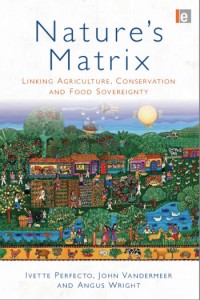
www.oneclimate.net Food security refers to the availability of food and one’s access to it. A household is considered food-secure when its occupants do not live in hunger or fear of starvation. According to the World Resources Institute, global per capita food production has been increasing substantially for the past several decades. In 2006, MSNBC reported that globally, the number of people who are overweight has surpassed the number who are undernourished – the world had more than one billion people who were overweight, and an estimated 800 million who were undernourished. According to a 2004 article from the BBC, China, the world’s most populous country, is suffering from an obesity epidemic. In India, the second-most populous country in the world, 30 million people have been added to the ranks of the hungry since the mid-1990s and 46% of children are underweight.
www.1billionhungry.org Worldwide around 852 million people are chronically hungry due to extreme poverty, while up to 2 billion people lack food security intermittently due to varying degrees of poverty (source: FAO, 2003). Six million children die of hunger every year – 17,000 every day. As of late 2007, export restrictions and panic buying, US Dollar Depreciation,increased farming for use in biofuelsworld oil prices at more than $100 a barrel, global population growth,climate change,loss of agricultural land to residential and industrial development,and growing consumer demand in China and Indiaare claimed to have pushed up the price of grain. However, Nonetheless, food riots have recently taken place in many countries across the world. Read More: > HERE <
As the Nobel Prize-winning economist Amartya Sen has observed that „there is no such thing as an apolitical food problem.“ While drought and other naturally occurring events may trigger famine conditions, it is government action or inaction that determines its severity, and often even whether or not a famine will occur. The 20th century is full of examples of governments undermining the food security of their own nations–sometimes intentionally.
There are many economic approaches advocated to improve food security in developing countries. Three typical approaches are listed below, click here . The first is typical of what is advocated by most governments and international agencies. The other two are more common to non-governmental organizations (NGO’s).
The third approach is known as food sovereignty; though it overlaps with food justice on several points, the two are not identical. It views the business practices of multinational corporations as a form of neocolonialism click here.
It contends that multinational corporations have the financial resources available to buy up the agricultural resources of impoverished nations, particularly in the tropics. They also have the political clout to convert these resources to the exclusive production of cash crops click here ,for sale to industrialized nations outside of the tropics, and in the process to squeeze the poor off of the more productive lands. Under this view subsistence farmers are left to cultivate only lands that are so marginal in terms of productivity as to be of no interest to the multinational corporations. Likewise, food sovereignty holds it to be true that communities should be able to define their own means of production and that food is a basic human right.
With several multinational corporations now pushing agricultural technologies on developing countries, technologies that include improved seeds, chemical fertilizers, and pesticides, crop production has become an increasingly analyzed and debated issue. Many communities calling for food sovereignty are protesting the imposition of Western technologies on to their indigenous systems and agency.
Those who hold a „food sovereignty“ position advocate banning the production of most cash crops in developing nations, thereby leaving the local farmers to concentrate on subsistence agriculture. In addition, they oppose allowing low-cost subsidized food from industrialized nations into developing countries, what is referred to as „import dumping“. Import dumping also happens by way of food aid distribution through programs like the USA’s „Food for Peace“ initiative.
www.fao.org , www.vandanashiva.org Vandana Shiva (Hindi: वन्दना शिवा; b. November 5, 1952, Dehra Dun, Uttarakhand, India), is a philosopher, environmental activist, eco feminist and author of several books. Shiva, currently based in Delhi, is author of over 300 papers in leading scientific and technical journals. She received her Ph.D. in philosophy from the University of Western Ontario, Canada, in 1978 with the doctoral dissertation:“Hidden variables and locality in quantum theory. Read More: > HERE < , Food Commodities Speculation and Food Price Crises http://www.srfood.org
Food Security Guide – Over one billion people experience the hardship that hunger imposes, a figure which continues to rise even amidst the riches of the 21st century. Engulfed within a vortex of population growth, economic instability and climate change, food security has become an urgent challenge for national and global governance. However, the feeble outcome of the 2009 World Summit on Food Security suggests that the richer countries are not yet ready to reorganise their dysfunctional priorities. http://uk.oneworld.net/guides/food
WASHINGTON (MarketWatch) — Those of us who believe that the economy should serve us instead of the other way around are conflicted. We know that the only way to end unemployment at home and poverty around the world is to make the economy grow faster. But we also know that nothing can grow forever, that the faster the global economy grows, the sooner we’ll run out of essential resources, including fossil fuels, water, arable land, healthy ecosystems and moderate climate. Economists and politicians can’t admit it, but the laws of physics apply, no matter what the latest polls tell us. The Earth has finite resources that will someday limit our economic growth.
The Earth cannot forever support 7 billion people consuming as much as Americans consume. And yet we’ve staked our future — individually, nationally, and maybe even as a species — on that impossible dream.
SOLUTIONS – Prosperity Without Growth, Professor Tim Jackson: Growth has delivered its benefits, at best, unequally. A fifth of the world’s population earns just 2% of global income. Inequality is higher in the OECD nations than it was 20 years ago. And while the rich got richer, middle-class incomes in Western countries were stagnant in real terms long before the recession. Far from raising the living standard for those who most needed it, growth let much of the world’s population down. Wealth trickled up to the lucky few.
Accordingly, this report sets out a critical examination of the relationship between prosperity and growth. It acknowledges at the outset that poorer nations stand in urgent need of economic development. But it also questions whether ever-rising incomes for the already-rich are an appropriate goal for policy in a world constrained by ecological limits. Its aim is not just to analyse the dynamics of an emerging ecological crisis that is likely to dwarf the existing economic crisis. But also to put forward coherent policy proposals that will facilitate the transition to a sustainable economy. In short, this report challenges the assumption of continued economic expansion in rich countries and asks: is it possible to achieve prosperity without growth?
In short, a ‘green stimulus’ is an eminently sensible response to the economic crisis. It offers jobs and economic recovery in the short term, energy security and technological innovation in the medium term, and a sustainable future for our children in the long term. Nonetheless, the default assumption of even the ‘greenest’ Keynesian stimulus is to return the economy to a condition of continuing consumption growth. Since this condition is unsustainable, it is difficult to escape the conclusion that in the longer term something more is needed. A different kind of macro-economic structure is essential for an ecologically-constrained world.
The above is an excerpt www.ecobuddhism.org : The full report can be downloaded here .
Available in PDF: New briefing: Food safety for whom? Corporate wealth versus people’s health by GRAIN, May 2011, further informations: www.corpwatch.org
A new briefing by GRAIN examines how „food safety“ is being used as a tool to increase corporate control over food and agriculture, and discusses what people can do and are doing about it. Below is a snapshot of what’s inside. The full briefing is available here.
View some additional photos here.
